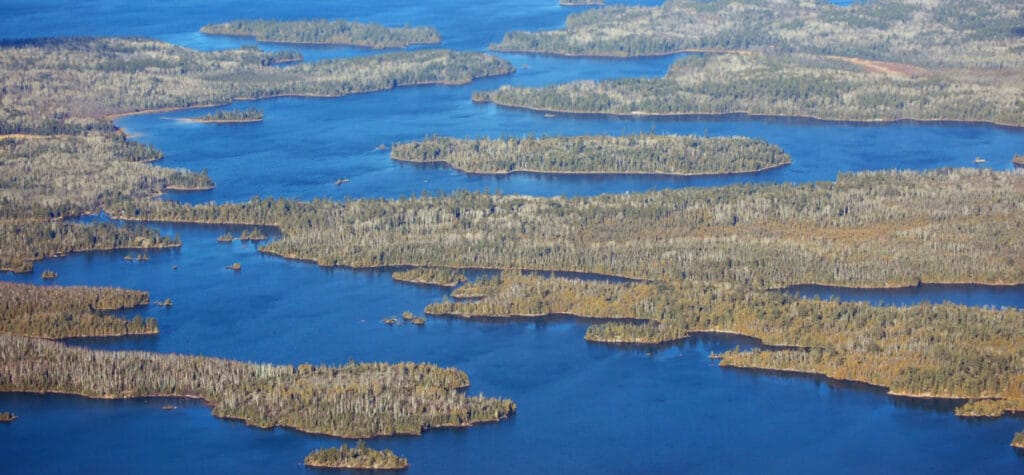
Minnesota Senator Tina Smith has asked two members of President Biden’s cabinet to direct their agencies to complete a study of copper-nickel mining in the Boundary Waters watershed, and investigate if a long-term moratorium is warranted.
Smith recently sent a letter to Secretary of Interior, Deb Haaland, and Secretary of Agriculture, Tom Vilsack, requesting they finish the two-year study that was initiated at the end of the Obama administration, and cancelled by Trump appointees shortly before completion.
Vilsack also served as Agriculture Secretary in the Obama administration, in charge of the agency that oversees the Forest Service. He championed the Boundary Waters in that role, and advocated for permanent protection after leaving government. Haaland has been a strong proponent of environmental protection during her time in Congress.
With Vilsack and Haaland now sworn in, the issue of mining in the wilderness watershed has returned to the forefront. Chilean company Antofagasta’s wholly-owned subsidiary Twin Metals has been drilling and developing a copper-nickel mine proposal near Birch Lake and the South Kawishiwi River for several years.

In the letter, Sen. Smith expressed support for northern Minnesota mining repeatedly. But, she said the Boundary Waters and Voyageurs National Park are too precious to put at risk without thorough analysis of environmental and economic risks and benefits.
“We owe it to all the people of the Minnesota to determine openly and transparently where it is safe and under what conditions it is appropriate to mine copper-nickel-sulfide deposits,” Smith wrote.
She pointed out that the Boundary Waters and Voyageurs and important to Minnesotans and the state’s identity, and visitors to the preserves are an important economic force. Smith also noted that the lands and waters have long been important to Native American people, and still are, with the tribes retaining treaty rights across the region.
Both of Minnesota’s senators have been generally quiet and cautious in regards to mining, balancing the industry’s historic economic impact with risks to the region’s clean water. Smith’s letter was a significant step.
Wilderness advocates applauded Smith, saying a study and moratorium would protect the Boundary Waters from “inevitable damage” if sulfide-ore mines are allowed to operate upstream of the wilderness.
“Senator Tina Smith’s support for protecting this priceless natural wonder and the thousands of jobs that depend upon it is tremendous news for not just Minnesotans, but for the thousands upon thousands of Americans who love this special place,” Tom Landwehr, executive director of the Campaign to Save the Boundary Waters, said in a statement. “We believe this science-based environmental assessment will show decision-makers the Boundary Waters should be protected.This is a critical step on the path to permanent protection.”
The assessment Smith is requesting would include a process of “mineral segregation and withdrawal,” and a review of whether or not mining can be done safely in the area and if the publicly-owned minerals in the wilderness watershed should be off limits.
A similar process has previously been used to protect Grand Canyon and Yellowstone National Parks from pollution caused by outside activities. Twenty years is the maximum length allowed by law. Wilderness defenders are confident the study will support a moratorium.
“We applaud Sen. Smith for taking the right steps on the path to ensure protections for the vulnerable landscape surrounding Boundary Waters Canoe Area Wilderness, and believe that reinstating the environmental assessment will prove that an administrative withdrawal is necessary,” said America Fitzpatrick, Senior Government Relations Representative at The Wilderness Society, “The science will demonstrate to the public that a permanent mineral withdrawal is the only long term solution to protect the pristine and beloved Boundary Waters Wilderness. This is the wrong place for the wrong mine.”
The Wilderness Society also urged both Minnesota Sens. Smith and Amy Klobuchar to introduce a companion bill in the Senate to Rep. Betty McCollum’s legislation that would prohibit mining in the wilderness watershed.
Twin Metals released a statement in response to Smith’s letter, saying the broader study of mining in the watershed was unnecessary when compared to environmental review of a specific proposal. “The stringent standards in place that Twin Metals will be required to meet will protect the surrounding region and the already permanently protected Boundary Waters Canoe Area,” the company said in a statement. “Twin Metals has developed its project under the highest global guidelines for responsible mining to ensure we will meet these standards.”
One environmental advocacy group applauded Smith’s move, but urged Smith to expand her advocacy for protecting Minnesota’s water.
“We agree that the Boundary Waters must be protected from toxic and destructive copper-nickel mining,” WaterLegacy wrote in a statement. “We call on [Sen. Smith] to publicly support protection of the St. Louis River and Lake Superior watersheds and downstream communities.” WaterLegacy also urged Smith to request the federal agencies reverse Trump administration policies that weakened the Clean Water Act.
The seriousness of the letter was not lost on mining boosters. State Senator Justin Eichorn (R-Grand Rapids), who chairs the Senate’s Mining and Forestry Committee, said it was an attempt to shut down mining. “Our Northern Minnesota mines already go through some of the strictest environmental regulatory standards in the entire world,” Eichorn said in a statement. “Adding another additional layer of red tape for political purposes is something I completely reject.”
In the letter, Smith pointed out that if the Trump administration had not cancelled the study 20 months into the 24-month project, the results would already be available. While formally requesting the agencies initiate a new study, she points out that all the previous work ought to mean the assessment can be completed in less than two years.
More information
- Letter from Sen. Tina Smith to Secretaries Haaland and Vilsack – March 26, 2021 (PDF)
- Twin Metals Minnesota Response to Senator Smith’s Letter Requesting a Mineral Segregation and Withdrawal Study for the Rainy River Watershed – Twin Metals
- Smith to Biden admin: Restart the study on copper-nickel mining near BWCAW – Duluth News Tribune

